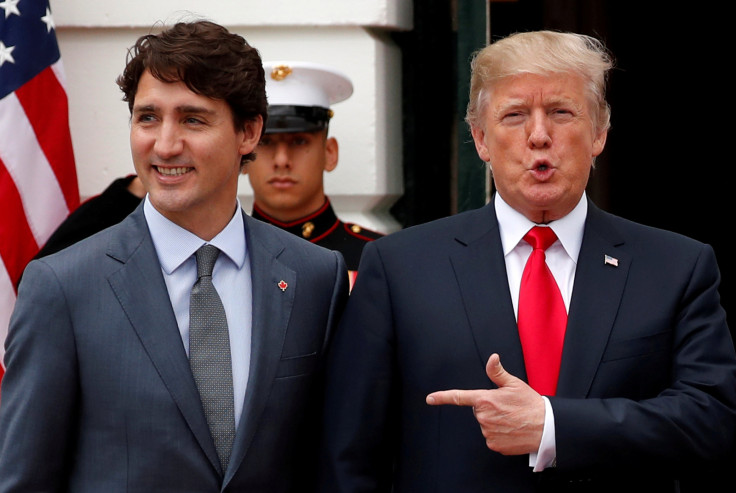USMCA a victory For Donald Trump, reduces global trade war risk: Analysts
Deal was a victory for President Trump, but offered little to the U.S. while giving the best possible outcome for Canada.
The new U.S.-Mexico-Canada Agreement (USMCA) reduces the risk of an escalating global trade war by allowing the Trump administration to turn its focus on trade tensions with China and the European Union, analysts say.
The analysts who spoke to International Business Times also said the deal, which updates the 1944 North American Free Trade Agreement (NAFTA) pact, was a victory for President Donald Trump, but offered little to the U.S. while giving the best possible outcome for Canada.
"The president and the administration is looking for a forward momentum on trade, so they can set sights on other issues with some of the more friendly trading partners," said Yung-Yu Ma, chief investment strategist at BMO Wealth Management. "It's likely to boil down quickly enough to an issue between the U.S. and China. So, Canada and probably next is the continued negotiations with the EU. It sets a positive momentum for these negotiations."
We've learned that the United States is not the friend, not the guaranteed market, that we'd always taken it for,
In a note seen by IBT, Bank of America said the USMCA deal reduced the risk of an escalation of global trade wars as it provided a path for other trade deals such as an eventual U.S.-China agreement.
After about a year of intense negotiations that strained relationships between Trump and Canadian Prime Minister Justin Trudeau, both parties signed a deal Sunday night. The U.S. and Mexico agreed to a deal Aug. 27.
Mark Zandi, chief economist at Moody's Analytics, said the new agreement simply salvaged NAFTA. "It will have no meaningful impact on jobs, wages or anything else," he said. "The only change to mention was on dairy, but the Canadians agreed to much of this in TPP (Trans Pacific Partnership) -- the free trade deal that Trump nixed."
Yung said it looked like the U.S. backed away from some of its big demands, such as scrapping the dispute resolution mechanism (Chapter 19), seen as a big deal for Canada.
"Canada probably considers itself quite fortunate to have gotten away with smaller concessions, I would say. The agreement with the U.S. -- it's very positive for Canada," Yung said, adding: "What came out is that the U.S. was also feeling a bit of pressure as well as the Trump administration wasn't clear what was going to happen if the U.S. sent a Mexico-only deal to the Congress."
The deal gives Trump his victory, if nothing else, according to analysts. Bank of America said the new deal constituted a win for Trump, and Yung thought "the changes appear to be more at the margin, but there are enough changes that the Trump administration could claim a victory."
"They'd rather have an okay deal with Canada that is very likely to pass Congress than no deal or continued trade fight with Canada and having the U.S.-Mexico agreement be under a cloud of uncertainty that might not get passed by the Congress," said Yung.
Canada, too, had been feeling the pressure and though it wanted a win-win deal for both countries, Yung said "it was unrealistic to think that Canada wasn't going to have to give up something."
Gary Clyde Hufbauer, senior fellow at Peterson Institute International Economics, said "the USMCA is an awkward name for a step backwards from free trade, but it's far better than what Trump threatened time and again – terminating NAFTA."

'CANADA WILL LOOK AT OTHER MARKETS'
Drew Fagan, a professor at the University of Toronto's Munk School of Global Affairs and Public Policy, said the deal seemed fair but "the bad feeling that's been engendered over the last year won't disappear overnight."
With 75 percent exports to the U.S., Fagan said Canada would look to diversify trade with other countries to reduce its dependency on the world's largest economy. "We've learned that the United States is not the friend, not the guaranteed market, that we'd always taken it for," he said.
National Bank of Canada said in a note "a deal is better than none, especially if it allows Canadian exporters to ship most of their wares tariff-free to the world's largest market."
Bank of America said the USMCA preserved the trilateral nature of NAFTA, which reduced uncertainty in the region. "At least some pent-up investment may be deployed as a result. The deal also reduces risk premium and is therefore supportive of Canadian assets such as CAD. It also clears the way for the Bank of Canada to continue hiking (interest rates)."
© Copyright IBTimes 2025. All rights reserved.





















